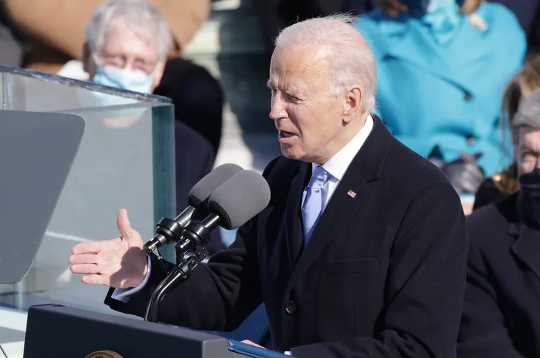
Joe Biden delivering his inaugural address on the West Front of the U.S. Capitol on January 20, 2021. Alex Wong/Getty Images
President Joe Biden called for American unity after four years of political divisiveness and the “raging fire” it provoked. He promised to be a president for all Americans. “I will fight as hard for those who did not support me as for those who did,” he said.
It was a message of hope and optimism. And while his intent was clearly to speak to all of America, his speech spoke in a different way to a particular community. The new president stutters, and his speech, made with the whole world watching, was a powerful example to those millions of Americans who, like me, stutter.
When I was 11 years old, my speech-language pathologist told me: “Look, John Stossel (the television personality) stutters, and he speaks beautifully. You will be able to do that, too.”
My therapist was trying to motivate me, but the message was that my goal should be to speak perfectly.
For me, that was not the case. By age 14, I already knew my stuttering was not going anywhere. Although I’m a fairly strong communicator, I continue to experience stuttering – a neurological condition that impacts the fluent, forward flowing production of speech.
Like me, roughly 1% of the world’s population stutters. That translates to more than 70 million people worldwide and over 3 million people in the United States, including Biden.
Biden’s experience with stuttering is a compelling one. What inspires me is the way he talks about his experience as a person who stutters. For people who stutter, the presidential campaign, Biden’s election and his inauguration mark an important change in how we discuss stuttering.
A need for understanding
People who stutter often suffer discrimination at work, as students and in social relationships.
Several studies show that the general population knows very little about stuttering. Many Americans also believe that people who stutter are less intelligent, less competent and more anxious.
Although I was surrounded by good friends, it felt very lonely to be a child who stutters. I was bullied and teased by my peers. People imitated how I spoke, interrupted when I was talking and even laughed when I stuttered.
Unfortunately, most role models were not helpful. Mel Tillis, the American country singer who used his stuttering as part of his stage persona, and Porky Pig, a cartoon character who stuttered, were the targets of jokes.
My goal became clear around my fifth birthday: I must find a way not to stutter.
Today, many children who stutter receive this message, although there is no “cure” for stuttering. Therapy and group support can help. But for many, stuttering requires attention for their entire lives.
Biden stands up to bullies
Biden has spoken about his struggles with stuttering during speeches for the National Stuttering Association and the American Institute for Stuttering.
But he had spoken sparingly about his stuttering in the mainstream media until his campaign for president began in 2019. Throughout the campaign season, President Donald Trump and his surrogates began seizing on hesitations and other characteristics of Biden’s speech.
During the campaign trail, Trump called Biden “Sleepy Joe” and said he was out of touch. He said Biden suffers from dementia. These insults were due partially to Biden’s age but also to the differences in his speech.
Biden responded to former White House Press Secretary Sarah Sanders, who mocked his stuttering during a 2019 Democratic presidential debate.
“I’ve worked my whole life to overcome a stutter. And it’s my great honor to mentor kids who have experienced the same. It’s called empathy. Look it up,” Biden said via Twitter.
During a CNN town hall in February 2020, he said he continues to stutter when he is tired.
This was good for me to hear, and I believe good for other people who stutter. Talking about stuttering, instead of trying to hide it, is an important part of coping.
{vembed Y=ol14llsEgi8}
Biden also chose Brayden Harrington to speak at the virtual Democratic National Convention. Harrington, a teenager who stutters, shared how Biden had helped him in 2019 by telling him it was OK to stutter.
He also shared how the former vice president continued to stay in touch. “Joe Biden cares,” Harrington said during his speech.
To me, it felt as if stuttering was finally being discussed in public and in a positive manner.
The first president who stutters
Certainly, Biden’s election as president matters for many reasons.
I suspect there have been more news articles and opinion pieces about stuttering published in major newspapers in the past 18 months than in the prior 18 years.
This is important because it raises awareness of stuttering and helps those in the stuttering community feel connected with others who also stutter, thus helping all of us understand their struggles.
Biden is an important role model because he has begun to talk openly about stuttering and because he has demonstrated that one can still stutter while communicating well and achieving astonishing goals.![]()
About The Author
Rodney Gabel, Professor and Founding Director, Binghamton University, State University of New York
This article is republished from The Conversation under a Creative Commons license. Read the original article.

Related Books:
Atomic Habits: An Easy & Proven Way to Build Good Habits & Break Bad Ones
by James Clear
Atomic Habits provides practical advice for developing good habits and breaking bad ones, based on scientific research on behavior change.
Click for more info or to order
The Four Tendencies: The Indispensable Personality Profiles That Reveal How to Make Your Life Better (and Other People's Lives Better, Too)
by Gretchen Rubin
The Four Tendencies identifies four personality types and explains how understanding your own tendencies can help you improve your relationships, work habits, and overall happiness.
Click for more info or to order
Think Again: The Power of Knowing What You Don't Know
by Adam Grant
Think Again explores how people can change their minds and attitudes, and offers strategies for improving critical thinking and decision making.
Click for more info or to order
The Body Keeps the Score: Brain, Mind, and Body in the Healing of Trauma
by Bessel van der Kolk
The Body Keeps the Score discusses the connection between trauma and physical health, and offers insights into how trauma can be treated and healed.
Click for more info or to order
The Psychology of Money: Timeless lessons on wealth, greed, and happiness
by Morgan Housel
The Psychology of Money examines the ways in which our attitudes and behaviors around money can shape our financial success and overall well-being.






















